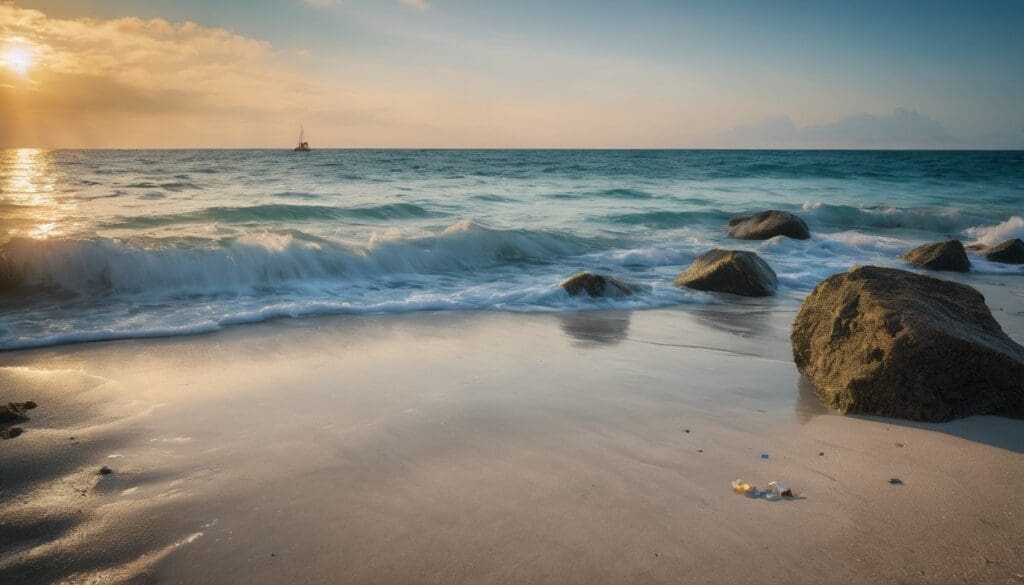There’s nothing quite like a stroll along the shore to soothe the soul, but it’s hard to ignore the unsightly litter that blights our stunning beaches. It truly hits home when you discover that a staggering 8 million metric tonnes of plastic are finding their way into our oceans every year.
Our guide is crafted with care to not only help spruce up our coastal edges but also bring people together and protect the diverse array of life beneath the waves. So roll up your sleeves – it’s time for us all to play our part in creating tidier, more welcoming coastlines!
Key Takeaways
- Selecting the right location, date, and time for a beach clean – up is crucial. It’s important to consider accessibility, tide times, local events, and weather conditions to maximise safety and participation.
- Obtaining permission from local authorities before organising a beach clean – up ensures compliance with regulations and access to disposal facilities. It also helps in coordinating with waste management systems for proper rubbish disposal.
- Effective promotion of the event can be achieved through social media engagement, collaborating with environmental organisations, press releases, community outreach, word-of-mouth publicity, and online event calendars.
- Gathering essential supplies like biodegradable bags, gloves, pickers or tongs is vital for the protection of volunteers during clean-ups. Proper first aid equipment on-site ensures safety measures are in place.
- After the clean-up event concludes ensuring all waste is correctly sorted between recyclables and non-recyclables aids effective recycling processes while contributing towards reduced landfill waste.
Why Beach Cleanups are Important
Beach cleanups are crucial for preserving marine life, preventing litter from entering the oceans, and educating the community about environmental conservation. These events play a vital role in maintaining clean and safe coastal environments for all to enjoy.
Impact on marine life
Our oceans are teeming with diverse marine life, but litter on beaches poses a serious threat to these ecosystems. Turtles can mistake plastic bags for jellyfish and choke while seabirds often ingest small pieces of plastic, filling their stomachs with toxins instead of nutrition.
Every piece of rubbish we remove from the beach helps to prevent such tragic outcomes.
Marine debris also destroys coral reefs and smothers seagrass beds, vital habitats for countless species. Let’s organise coastal cleanups that contribute to maintaining healthier homes for fish, crustaceans, and other ocean creatures.
By taking action together in local beach cleanups, we protect marine life and ensure the survival of our astonishing underwater worlds for generations to come.
Prevention of litter from entering oceans
Preventing litter from entering oceans is crucial for safeguarding marine life and preserving the delicate balance of our ecosystems. Proper waste management, such as recycling and responsible disposal, helps reduce the amount of plastic and debris that end up in our seas.
By organising beach cleanup events and actively participating in coastal cleaning campaigns, we can play an active role in preventing pollution from reaching our oceans. Engaging local communities to adopt eco-friendly initiatives also contributes to protecting marine habitats.
To prevent litter from entering oceans effectively, we must advocate for sustainable living practices and promote awareness about oceanic preservation. Encouraging proper waste management while engaging in public outreach activities will help combat coastal pollution resulting in a cleaner environment for both humans and wildlife.
Community involvement and education
To involve the community and raise awareness, we host regular beach cleanups. These events provide an opportunity for volunteers to actively participate in keeping our beaches clean and safe for marine life.
Through our educational initiatives, we aim to enlighten others about the impact of marine debris on the environment, encouraging eco-friendly practices among participants.
Engaging with local schools, environmental groups, and coastal communities is essential in spreading the word about our beach cleanup activities. By creating partnerships with like-minded organisations and involving people from all walks of life, we can make a significant collective effort towards preserving our coastlines.
Organising a Beach Cleanup Event
When organising a beach cleanup event, it’s important to choose a suitable location, date, and time. Obtain permission from local authorities and gather supplies for the cleanup. Spread the word to encourage community involvement and make sure all necessary information is provided to volunteers.
Choosing a location, date, and time
We need to carefully consider the location, date, and time for our beach clean-up event.
- Identify a beach that is in need of cleaning and accessible to volunteers.
- Select a date and time that works for the community and avoids conflicts with other events.
- Consider weather conditions and tides when choosing the best time for the clean-up.
- Consult with local authorities to ensure there are no conflicting permits or events scheduled on the chosen date.
- Take into account seasonal factors to maximise participation and impact on marine life.
- Ensure that the location, date, and time are well publicised to attract a diverse group of volunteers.
Obtaining permission and information
To host a beach clean-up, obtaining permission and information is crucial. Here’s what you need to do:
- Contact the local authorities or beach management to secure permission for the event. Provide details about the clean-up, including date, time, and estimated number of volunteers.
- Inquire about any specific regulations or guidelines for conducting clean-ups on the chosen beach or coastal area, ensuring compliance with environmental policies and safety measures.
- Obtain information about waste disposal facilities available in the vicinity and any special requirements for disposing of collected rubbish, such as recycling options or hazardous waste protocols.
- Communicate with local environmental organisations or community groups that have experience in organising similar events to gather valuable insights and advice for a successful beach clean-up.
- Collaborate with relevant stakeholders, such as conservation authorities or tourism boards, to raise awareness about the event and seek their support in promoting community participation and engagement.
Spreading the word
After obtaining permission and information, it’s time to spread the word about our beach clean-up event. Here are some ways to get the message out:
- Social Media Engagement: Utilise platforms such as Facebook, Twitter, and Instagram to create posts, share updates, and encourage people to join the event. Use popular hashtags like #beachcleanup and #environmentalawareness to reach a wider audience.
- Local Community Outreach: Connect with local community centres, schools, and businesses to distribute flyers or send out email newsletters promoting the event. Engage with local influencers or environmental groups to amplify the message.
- Collaborate with Environmental Organisations: Reach out to established environmental organisations for their support and collaboration in promoting the beach clean-up event. Their endorsement can attract more participants and volunteers.
- Press Releases: Draft and distribute a press release to local newspapers, radio stations, and online news platforms highlighting the significance of the beach clean-up event and inviting individuals and groups to participate.
- Word of Mouth: Encourage volunteers and participants to spread the word among their family, friends, and colleagues through personal conversations or by sharing event details on their social networks.
- Customised Merchandise: Create promotional items such as t-shirts or reusable bags featuring the event logo and details. Distribute these items among volunteers who can wear or use them as conversation starters about the upcoming clean-up.
- Online Event Calendars: List the beach clean-up event on relevant online platforms that promote community activities and events. This helps in reaching individuals looking for opportunities to engage in eco-friendly initiatives.
Gathering supplies
To ensure a successful beach clean-up event, we must gather essential supplies to support our efforts. We will need the following items:
- Biodegradable rubbish bags: These are essential for collecting and disposing of the litter in an environmentally friendly way.
- Gloves: Providing volunteers with sturdy gloves will protect their hands during the clean-up and prevent any potential injuries.
- Pickers or tongs: These tools will make it easier for volunteers to pick up small pieces of litter without having to bend down constantly.
- First aid kit: Safety should always be a priority, so having a first aid kit on hand is crucial in case of any minor injuries.
- Water and snacks: Keeping volunteers hydrated and energised is important, so providing water and snacks will keep everyone going throughout the event.
- Sunscreen and hats: Protection from the sun is vital, especially during outdoor activities, so providing sunscreen and hats will help keep volunteers safe from sun damage.
- Signage and markers: Using signs to direct volunteers and markers for recording data on the collected litter will help keep everything organised.
Running the Cleanup
Assign stations to volunteers, record trash findings, dispose of waste properly, and ensure a clean and safe environment afterwards.
Assigning stations to volunteers
When organising a beach clean-up event, we assign stations to volunteers to ensure an organised and efficient operation. Here’s how we do it:
- We divide the beach area into sections, such as shoreline, sand dunes, and car park.
- Each section is assigned a team leader who oversees the volunteers working in that specific area.
- Volunteers are given clear instructions on their tasks, such as collecting rubbish, sorting recyclables, or keeping track of data.
- We provide necessary equipment like gloves, bags, and tools according to the assigned stations.
Sorting and recording trash findings
Proper disposal
After the cleanup, we separate recyclable items from non-recyclable ones, aiming to reduce waste going to landfills. The collected rubbish is then sorted into categories for proper disposal and recycling. Here’s a detailed breakdown of the proper disposal process:
- Separating Recyclables: We meticulously sort plastics, glass, and metals from other debris to ensure they are properly recycled.
- Proper Disposal of Hazardous Waste: Any hazardous materials such as batteries, chemicals, or sharp objects are handled with care and disposed of following environmental regulations.
- Landfill Disposal: Items that cannot be recycled are responsibly disposed of in designated landfill facilities to minimise their impact on the environment.
- Collaboration with Local Authorities: We work closely with local waste management authorities to ensure that all waste is disposed of correctly and safely.
- Documentation: Keeping records of the amount and types of waste collected helps us track our impact and plan for future clean-up efforts.
- Education: Through proper disposal practices, we aim to raise awareness about the importance of responsible waste management and its positive effects on our environment.
Ensuring a clean and safe environment afterwards
After the clean-up, we carefully inspect the entire area to ensure it is completely free of debris, and that no harmful items are left behind. We also check for any potential hazards or unsafe conditions to make certain that everyone can enjoy the beach safely.
- Thoroughly scan the area for any missed trash or hazardous material such as broken glass, sharp objects, or chemical waste. This helps in preventing any harm to people or wildlife that may come into contact with it.
- Utilise proper disposal methods for all collected trash and recyclables, making sure that they are taken to the appropriate waste management facilities or recycling centres.
- Level out and smooth over sand areas where volunteers may have dug up deep holes during their search for debris. This will prevent accidents and maintain a safe environment for future beachgoers.
- Encourage participants to engage in further clean-up efforts by disposing of their personal waste and promoting eco-friendly practices at home and within their communities.
After the Cleanup
Thanking volunteers, joining and supporting clean-up organisations, encouraging ongoing efforts to keep beaches clean, and promoting environmentally friendly practices. Read more about the importance of organising a beach clean-up event and how you can make a difference in preserving our coastal environment.
Thanking volunteers
We express our deep gratitude to all the dedicated volunteers who rolled up their sleeves and contributed their time and energy to make our beach cleanup event a success. Your commitment to preserving our coastal environment is truly commendable, and your hard work has made a tangible impact in keeping our beaches clean and safe for everyone to enjoy.
Each piece of trash collected, every plastic bottle disposed of properly, and all the efforts you put in have not gone unnoticed. Your involvement is crucial in raising awareness about the importance of environmental conservation.
As we continue with future initiatives, we hope that you will join us once again in organising activities aimed at protecting our oceans and coastlines from pollution. Together, let’s keep nurturing a community that prioritises eco-friendly practices and ensures the preservation of our natural resources for generations to come.
Joining and supporting cleanup organizations
To further our impact on keeping beaches clean, we can connect with and support established beach clean-up organisations. By joining these groups, we extend our reach and make a greater difference within the community.
These organisations offer opportunities to participate in regular beach cleaning activities and join coastal clean-up events. Additionally, they provide resources for volunteer coordination and eco-friendly initiatives, allowing us to contribute to a larger conservation effort.
Moreover, supporting beach clean-up organisations promotes ongoing efforts to keep beaches clean by engaging more individuals and fostering a sense of environmental responsibility.
Encouraging ongoing efforts to keep beaches clean
Encouraging ongoing efforts to keep beaches clean is crucial for the preservation of our coastal ecosystems. Engaging in regular beach clean-ups, recycling, and reducing single-use plastics are effective ways to protect marine life and maintain a healthy environment.
Joining local clean-up organizations or initiating community beach cleaning campaigns can also make a significant impact. We must continue to promote eco-friendly initiatives and support conservation efforts to ensure our beaches remain clean and safe for future generations.
Supporting environmentally friendly practices such as proper waste disposal and responsible consumption are essential for maintaining the cleanliness of our beaches. By actively participating in beach clean-up activities, organizing regular clean-up events, and spreading awareness about the importance of preserving coastal areas, we can collectively work towards ensuring that our beaches remain free from pollution.
Promoting environmentally friendly practices
As environmentally conscious individuals, we can further support conservation efforts by promoting eco-friendly practices beyond beach cleanups. We can reduce our use of single-use plastics and opt for reusable alternatives, such as water bottles, bags, and straws.
Additionally, participating in recycling programs and supporting sustainable products helps minimise waste that could end up in our oceans. By advocating for policies that protect our natural habitats and wildlife, we can contribute to the larger movement of preserving the environment.
Furthermore, educating others about the importance of environmental stewardship is crucial. Sharing information about ways to reduce carbon footprint and engaging in eco-friendly initiatives strengthens community engagement and promotes a culture of sustainability.
Conclusion
In conclusion, organising a beach cleanup event is an impactful way to protect marine life and prevent litter from entering oceans. It also promotes community involvement and education about environmental conservation.
By choosing a location, obtaining permission, running the cleanup efficiently, and showing appreciation afterward, we can make a significant difference. Let’s encourage ongoing efforts to keep beaches clean and support environmentally friendly practices for a healthier planet.
FAQs
1. How do I start a beach clean-up?
To start a beach clean-up, gather community support, choose a date, and organise volunteers to collect rubbish on the shoreline as an eco-friendly initiative.
2. What should I consider when organising a beach clean-up?
When organising a beach clean-up, think about safety gear for volunteers, getting proper permits if required, and arranging disposal of collected waste responsibly.
3. Can anyone join in hosting a beach clean-up event?
Yes! Anyone can host a community beach clean-up by planning the event carefully and inviting local residents or groups interested in environmental activities to participate.
4. Are there specific activities to include during a beach cleaning activity?
During your beach cleaning activity, you might plan things like separating recyclables from other trash or having educational talks on protecting marine life alongside the actual clean-up.
5. Is it important to team up with larger organisations for international coastal clean-up events?
Teaming up with larger organisations experienced in international coastal clean-ups can provide additional resources and help increase the impact of your eco-friendly efforts at the local level.





